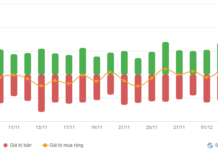Gojek, the Indonesian ride-hailing and food delivery platform, bid farewell to the Vietnamese market on September 16th. According to Gojek, this decision aligns with the long-term growth strategy of its parent company, GoTo, Indonesia’s largest tech group.
A Short-Lived Venture
Gojek entered the Vietnamese market in August 2018 as GoViet, offering two services: GoBike for motorbike rides and GoSend for deliveries. Just two months later, they launched their online food delivery service, GoFood, becoming a formidable competitor to Grab with their promotional campaigns featuring rides for as low as 1,000 and 5,000 VND. However, this intense competition within the industry led to sudden resignations of GoViet’s top executives, including CEO Nguyen Vu Duc and COO Nguyen Bao Linh, just six months after their launch. Le Diep Kieu Trang, former CEO of Facebook Vietnam, took over as GoViet’s new leader, only to leave five months later.
In its first year of operation, GoViet achieved impressive results, reaching 100 million orders. This number doubled in the subsequent six months. However, in August 2020, the GoViet brand was discontinued, and the company was renamed Gojek Vietnam. The company also changed its color scheme from red to green, black, and white, mirroring its parent company, GoTo. Mr. Phung Tuan Duc, GoViet’s operations director at the time, was appointed as the new CEO of Gojek Vietnam.
Gojek Vietnam was lagging behind its rivals at that point. According to ABI Research, GoViet held only a 10.3% ride-share, compared to Be’s 15.6% and Grab’s dominant 72.8%. In the food delivery segment, GoFood also trailed GrabFood and Now in terms of customer satisfaction and regular usage. The COVID-19 pandemic further impacted Gojek Vietnam’s operations in 2021 and 2022. GoTo reported a 56% increase in net losses in 2022 compared to the previous year, amounting to $2.7 billion.
In January 2023, Mr. Phung Tuan Duc left Gojek Vietnam to pursue other opportunities. His replacement was Mr. Sumit Rathor, Gojek’s regional director in Indonesia, who became the fourth CEO of Gojek Vietnam since its establishment. According to Momentum Works, a market research company, Gojek held a meager 3% of the total goods value (GMV) in Vietnam’s food delivery market in 2023.
A recent report by Q&Me on the “Popularity of Motorbike Hailing Apps in 2024” revealed that Grab still leads the market with a 42% share. Be and Xanh SM, two homegrown apps, are gaining traction with 32% and 19% shares, respectively. Gojek, once one of the most popular apps, has slipped to fourth place, with only 7% of regular users.
Gojek Vietnam’s representative assured that they would provide necessary support to all affected parties during the transition, including employees, users, driver-partners, restaurant partners, and that they would comply with applicable regulations and laws.

Gojek is the third ride-hailing app to exit the Vietnamese market. Photo: Le Tinh
A Shrinking Market Share
According to market expert Pham Chinh, Gojek’s exit from Vietnam was predictable, given the new CEO of GoTo’s focus on quick profitability and cost-cutting measures. GoTo has already downsized its operations in Indonesia, and their strategy is to focus on large, profitable markets. Their temporary suspension of Gojek’s operations in Thailand in 2021 and the current situation in Vietnam follow this pattern. Vietnam, with its small market share and fierce competition, could directly impact the parent company’s profitability.
Mr. Chinh also highlighted the intense competition in the ride-hailing and food delivery markets, with all participants still in the investment phase and accepting losses to gain market share. The competition is not limited to the same industry, as ride-hailing apps also compete with traditional and new taxi services, such as the recently launched Taxi Xanh Dien. This makes it challenging for companies to become profitable, especially when they have to continuously invest in infrastructure to upgrade their services to meet the ever-increasing demands of consumers.
Tran Anh Tuan, Deputy Director of the Institute for Innovation Research and Application for Enterprise Renovation, echoed the sentiment, stating that the market is extremely competitive. Similar to e-commerce, many players, from corporations to startups, are vying for a limited market, making it less attractive. Gojek’s exit is not surprising, given the market primarily competes on price, and their rivals offer diverse products on multiple platforms. Gojek’s departure will not significantly impact the market, as there are other players ready to fill the void.
Three Remaining Ride-Hailing Apps
Before Gojek, two prominent brands, Uber, and Baemin, exited the Vietnamese market. Uber left in early 2018, and Baemin, a South Korean food delivery app, ceased operations in late 2023 after nearly five years of presence in the country. Despite being one of the most popular food delivery apps in Vietnam and maintaining consistent revenue growth, Baemin incurred significant losses due to uncontrolled market expansion, amounting to over 4,000 billion VND in post-tax losses from 2020 to 2023.
With Gojek’s departure, Vietnam is now left with three major ride-hailing apps: Grab, Be, and Xanh SM.
Loyalty Lies with Promotions
According to Phí Anh Tuấn, CEO of P.A.T Consulting Ltd., the main reason behind Gojek’s and other similar companies’ exits from the Vietnamese market is the lack of brand loyalty among consumers, who are quick to switch to other services if they offer better promotions.
“Boosting Revenue by 80% to $3.7 Billion, Mobile World’s Mom and Baby Chain Rivals Bibo Mart, But Still Trails Kids Plaza and Con Cung”
The latest figures from Vietdata reveal a disappointing performance for most retailers in the mom-and-baby sector in 2023. A slump in revenue has been the norm for these businesses, with the notable exceptions of Kids Plaza and AvaKids, who have bucked the trend and posted impressive growth.






































